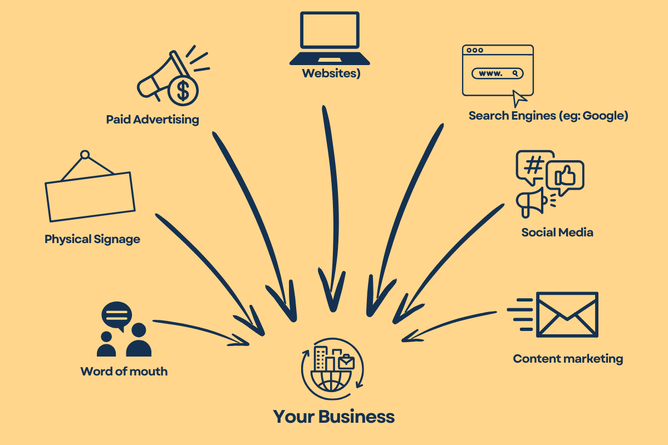In today's digital age, marketing has evolved dramatically, especially for trades and service-based businesses. Embracing digital marketing can mean the difference between thriving in a competitive market and being left behind. However, the term "marketing" often means different things to different people, making it overwhelming to determine where to start. This blog explores what digital marketing means and how it can be a powerful tool for lead generation.
Lead Generation Explained
Lead generation is the process of attracting and converting potential clients into leads, or individuals who have expressed interest in your business. For service-based businesses, generating leads is crucial for sustainable growth, especially in a competitive market and a challenging economy.
Digital marketing plays a pivotal role in this process, helping businesses reach potential clients who may not have found them otherwise.
Understanding Digital Marketing
Digital marketing is an umbrella term that covers a wide range of strategies and tactics used to promote your business online. It's more than just posting on social media; it encompasses everything from websites and SEO to paid advertising and content marketing. The primary goal for service-based businesses is to use these digital channels to generate leads and grow their customer base.
A marketing channel is any medium used to promote your company. These channels can be traditional, like radio or print ads, or digital, like websites, search engines, social media, email marketing, and online advertising.
Consider the below graphic which demonstrates how multiple channels can feed into your business. Effective digital marketing means optimizing all of these channels to make it easy for clients to find and contact you. This involves building a strong online presence and ensuring that your branding is consistent and professional across all platforms.
Four Benefits of Digital Marketing
Reach a Wider Audience: Digital marketing allows you to expand your reach beyond your local area and target more potential customers. For example, with paid advertising, your ads can be seen by thousands of people daily.
Build Trust and Credibility: By showcasing your expertise through informative content and customer testimonials, you can establish trust and credibility with potential customers, making them more likely to choose you over competitors.
Stay Competitive: In today's digital-first world, consumers expect to find information about businesses online. Without digital marketing, you risk falling behind competitors who are actively engaging with customers online.
Track and Measure Results: One of the most significant advantages of digital marketing is the ability to track and measure the performance of your campaigns in real-time. This allows you to optimize your marketing efforts for better results and a higher return on investment.
Now, let’s take a closer look at the five main digital channels we focus on at Pickle Digital. We'll explore what each channel is, the benefits they offer to your business, and some practical steps you can take to implement and optimize them for growth.
Deep Dive into the 5 Digital Channels
1. Paid Advertising on Google and Meta
What It Is:
Paid advertising, also known as pay-per-click (PPC) advertising, involves paying for ads on platforms like Google (through Google Ads) and Meta (Facebook and Instagram). These ads can appear in search results, social media feeds, or on partner websites, targeting specific audiences based on demographics, interests, and behaviors.
Benefits:
Immediate Visibility: Quickly get your business in front of potential customers.
Targeted Reach: Ads can be precisely targeted to reach specific demographics or user behaviors.
Measurable Results: Track performance through analytics and adjust campaigns for better ROI.
2. Website / SEO
What It Is:
Your website serves as your digital storefront, and SEO (Search Engine Optimization) is the practice of optimizing your site to rank higher in search engine results. This involves optimizing content, technical elements, and user experience to attract more organic traffic.
Benefits:
Increased Visibility: Higher rankings mean more visibility and traffic.
Cost-Effective: Unlike paid ads, organic traffic is free.
Credibility and Trust: High-ranking websites are often perceived as more trustworthy and authoritative.
3. Search Engines (Google)
What It Is:
Search engines, particularly Google, are critical for driving traffic to your website. Users typically find businesses through organic search results or paid ads when searching for services or products.
Benefits:
High Intent Traffic: People searching on Google are often actively looking for solutions.
Broader Reach: Capture a global or local audience depending on your business model.
Data Insights: Google Analytics and Search Console provide valuable insights into user behavior and site performance.
4. Social Media
What It Is:
Social media platforms like Facebook, Instagram, LinkedIn, and Twitter provide a space to connect with your audience, share content, and build brand awareness. It’s a two-way communication channel that allows for engagement and interaction.
Benefits:
Increased Brand Awareness: Reach a wider audience and establish your brand presence.
Engagement and Interaction: Engage directly with customers, answer questions, and gather feedback.
Targeted Advertising: Use detailed targeting options to reach specific audiences.
5. Content Marketing
What It Is:
Content marketing involves creating and distributing valuable, relevant, and consistent content to attract and retain a clearly defined audience. It can include blogs, videos, podcasts, infographics, and more.
Benefits:
Establishes Authority: Position your business as an expert in your field.
Engages and Educates: Provides valuable information to your audience, building trust and loyalty.
Supports SEO: High-quality content can improve your website's SEO performance.
Go Digital, Remain Competitive
By leveraging these digital channels effectively, you can enhance your online presence, attract more leads, and ultimately grow your business. Digital marketing is not just about being online; it's about being strategic, consistent, and responsive to your audience's needs.


